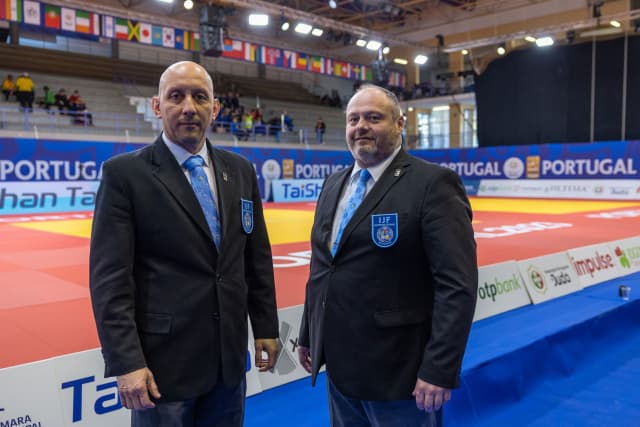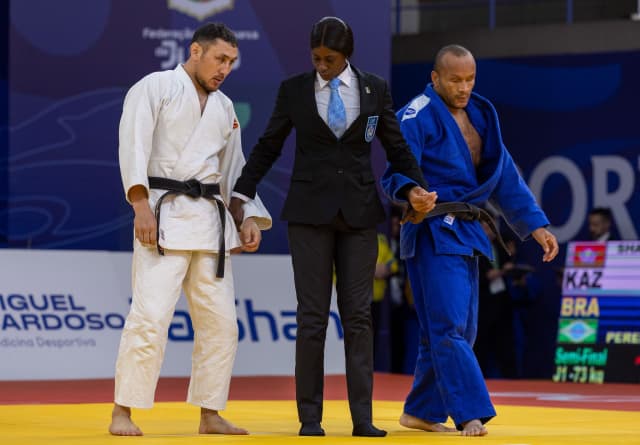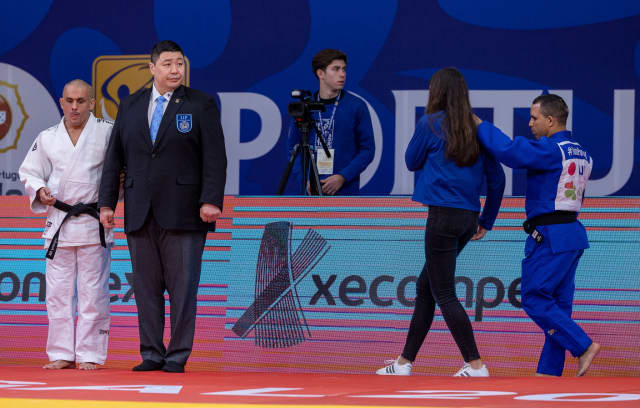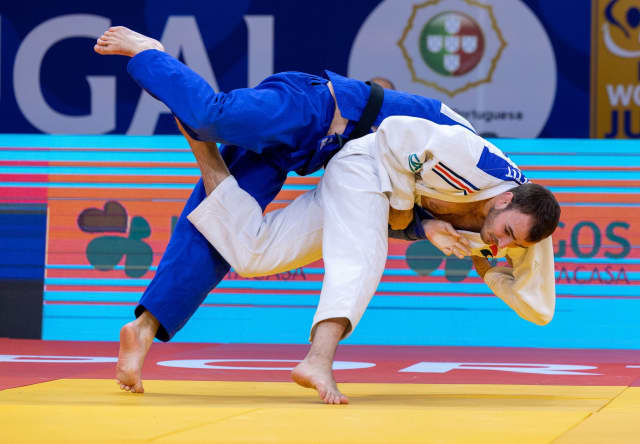Noting that the role of the referees is fundamentally crucial is also very important and deserves some attention. Roland Poiger (AUT), a referee on the IBSA circuit for four years, has a lot of experience. David Fuentes (AUS) is in his second IBSA tournament and he continues to discover its philosophy. Both were happy to be able to share their feelings. It should also be noted that both are also referees on the WJT and that they have just spent three days refereeing at Grand Prix Portugal 2023. This is explained by the close co-operation between IBSA and the IJF, a co-operation whose aiming to offer all judoka a top-level organisation.
"For four years I have been refereeing IBSA competitions and I have seen a lot of changes in a short period of time. Beyond these changes that affect the organisation of competitions, what is most significant during IBSA tournaments is the growing communication that we establish with the judoka. It's not a game, it's an absolute necessity. We are a big family and in this branch of judo everyone knows each other. When we get on the tatami, the contact is immediately established with the competitors and this connection is very special. You see a part of it, but you don't see all of it. The emotional part is very big,” explained Roland.
For David, "At the start of every match I tell the athletes, 'I'm the referee from Australia.' One day an athlete said to me, 'yes I remember, because of your perfume.’ It's quite incredible. Much more than in other competitions, we establish a direct bond made of respect and understanding. I even had athletes who thanked me after the match. That never happens on the international circuit.” David laughs, “I must say that I am impressed by the judoka and especially by the J1 judoka, who see absolutely nothing. They need us and we are there for them."
In these first remarks we immediately feel that it is not only a question of refereeing. You then realise that actually Roland and David speak with one voice, one supporting the other and the other complementing one, "Here we have two jobs. The first is to referee, obviously, and this remains at the centre of our profession, but we must also guide, accompany, inform, support, secure and more. The competitors feel this perfectly. We are not only there to give scores and penalties. Without our presence, there would be everything but competition.
What is also intriguing at first, but ultimately corresponds perfectly to the spirit of judo, is the mutual help that exists between the competitors. They are both opponent and partner. As on the WJT, they are there to fight, to win, to reach the podium and to qualify for the Paralympic Games; there is no doubt. But at the same time, they also need each other. We often see judoka helping each other back to the starting point or to get up. We then play the role of catalyst. They know that at any moment we are not far away and that we are ready to help."
Among the differences between sighted judo and para-judo, there is the non-sanctioning of stepping out of the tatami and the set-up of the kumi-kata at the beginning of the matches and after each ‘mate,’ "As soon as the athletes approach from the edge we call, ‘jogai,' which informs them of the danger of being near the exit,” says Roland. “Our positioning is then very important, because the judoka find their way back by the sound of our voice. We must be close to the centre, so they can follow us but honestly, it's always amazing to observe how athletes who can't see anything at all have the ability to orientate themselves. We can't relax our attention though, we're a beacon, in a way.
The other big difference is that there is no battle for the kumi-kata. This is installed and from the first hajime on, there is only room for attacks. There are no frills, usually no penalties for blocking the opponent. It's judo, it's pure."
This allows us to come back to the first astonishment that we had hardly dared to mention. Yes para-judo is judo and it is beautiful, exciting and thrilling. "I take great pleasure in refereeing IBSA competitions. It's a real joy and I see a multitude of beautiful judo techniques," explained David. "For my part, I always feel very moved to referee para-judo and I am really very proud of it. A few years ago para-judo and judo were completely separated. This is no longer the case. We had the need to join forces in order to show the whole world what we are all capable of, regardless of our physical abilities. Having the chance to be part of this beautiful family pushes me to be more open to others. I want to help more and wherever I can. Alone we can't do it," added Roland.
So for sure there are some differences between para-judo and sighted judo but these differences are only there to guarantee safety and fairness for all. Asked if the work done with the IBSA helps them to officiate on the WJT, David and Roland are clear, "It's just obvious. It goes both ways. On the world circuit you can focus on pure refereeing and it becomes almost easier because we take away our guiding role. What is clear is that it is an exchange and we are happy to be mediators in that."
One might mistakenly think that referees don't have emotions, or that they shouldn't. This is a serious mistake. They are men and women who, in contact with other men and women, become beings charged with positive and constructive emotions which do them good and, in turn, do society a lot of good. It is as simple as that.
Hajime! IBSA Judo Grand Prix is on! Breaking barriers and defying limits 💪 #Judo #IBSA pic.twitter.com/stw7FViTeg
— Judo (@Judo) January 30, 2023
More images of the IBSA Judo Grand Prix Portugal 2023 - CLICK HERE




